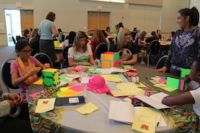 |
| LAW |
The Summer Engineering Experience for Kids (SEEK) program was begun last summer by the National Society of Black Engineers (NSBE) to provide a hands-on showcase of science, technology, engineering and math to students as young as third grade. “We had to go deeper into the K-12 pipeline,” says Carl B. Mack, NSBE executive director. “Trends showed that students were turned off to STEM fields by middle school.”
 |
 Students build motorized toy (top).
|
The tuition-free program was funded with million-dollar grants from think tank Battelle and from equipment maker Caterpillar Inc., which also provided some of the curriculum. Last summer’s SEEK, held at a public charter school in the city’s northeast section, had about 300 participants, with another 100 on the waiting list. This year, NSBE will repeat the program for grades 3-5 and create a new one for grades 6-8 in another Washington location, and in Columbus, Ohio, where Battelle is based. It seeks to recruit more minorities for a planned high-tech corridor in central Ohio. Last year’s SEEK graduates were guaranteed a spot this summer, and about 150 are returning, says NSBE. There are plans to expand it to grades 9-12 in 2009.
Mack says the program offers students a hands-on introduction with experiments and building projects that teach engineering terms and principles, hypothesis testing and team skills. SEEK recruited about 70 minority college-level engineering students as teacher-mentors.
 Minority student program expands in 2008.
|
Alaina Law is one veteran mentor whose experience last year proved valuable. The native of Fort Mill, S.C., had a new degree from Clemson University in agricultural mechanization and business and an engineering minor, but no job. She saw SEEK as a way to “positively impact our community.”
Law, whose mother was the first black woman to earn a chemical engineering degree from West Virginia University, Morgantown, and went on to a top job at Hoechst Celanese Corp., notes the benefits of campers seeing so many minority kids in college programs. She says that last summer’s mentors tracked many of the kids during their school year. “This year, some of our mentors turned down good internships to do this,” says Law, who has been hired by NSBE as director of its pre-college initiative programs.
espite the draw of a new baseball team and other summertime pursuits in Washington, D.C., hundreds of mostly African-American elementary and middle school kids there will spend three weeks next month at a school-based day camp doing what engineers and other science professionals do. The success of last year’s camp, based on the length of its waiting list, indicates that the 2008 expanded program is proving a worthy contender for students’ time and interest. Law says SEEK teaches students “a different way to think about math and science. Black students are more visual learners and more hands on.” But she notes that sometimes students teach their mentors. “Little kids think much better out of the box,” says Law. Parents of campers note a positive impact on critical thinking, team dynamics and self-image. Said one: “My child now sees that education and being smart are cool and fun.”




